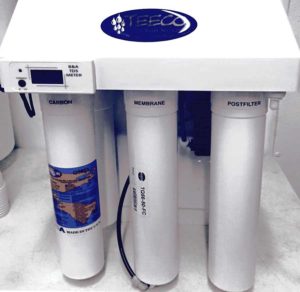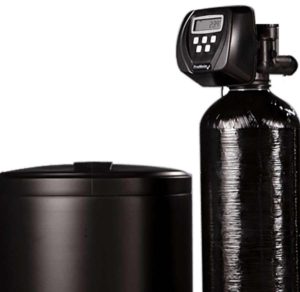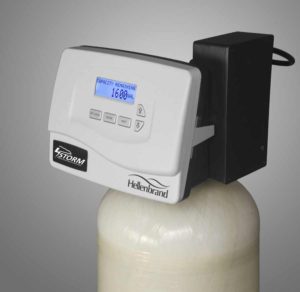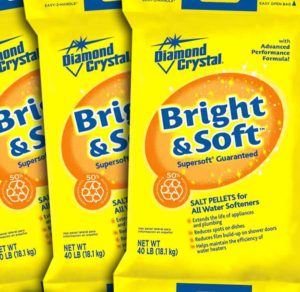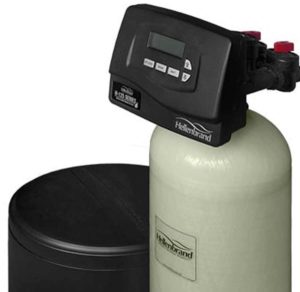Clean drinking water and problem water solutions. Say Goodbye to Bad Water. With Teeco Water Technologies
Teeco Water technologies provides the most effective way to get clean drinking water of the highest quality for your entire family.
(402) 439-5030
Why continue putting up with problem water?
Specializing in problem water since 1995! Your locally owned and operated clean drinking water solution in Stanton, Nebraska
Nature intended us to have clean drinking water. This is why there is a continuous water cycle, whereby water from our oceans, rivers, lakes, and streams falls to the ground as rain or snow and becomes filtered as it seeps through the earth’s surface. As the water works its way through the ground, it picks up minerals by dissolving limestone, causing water hardness. Water may also come into contact with Iron, Manganese, Arsenic and other contaminants, which cause additional water treatment problems.
Our Clean Water Products & Services

Common Groundwater Issues and Pollutants Our Products Will Eliminate
ACIDIC WATER / LOW ph WATER
Acidic water can be caused by acid rain, soil microbes, tree roots, or rock formations. Acidic water usually contains heavy metals such as lead, copper, nickel, etc. Heavy metal poisoning can lead to symptoms such as nausea, diarrhea, abdominal pain, organ damage, and more.
Acidic water can cause damage to your plumbing and water-using appliances. Typically, acidic water damage first shows up as a blue-green build-up around pipe fittings.
ARSENIC IN DRINKING WATER
Arsenic occurs naturally in rocks and soil. Small amounts can dissolve into groundwater that may be used for drinking water. Drinking water with arsenic in it can increase your risk of cancer and other serious health conditions. It is important to know how much arsenic is in your drinking water and how you can reduce your exposure.
BAD TASTING WATER
If your water comes from a well, it may seasonally develop an earthy or musty taste and smell. This taste is caused by algae and bacteria that are naturally present in bodies of water as well as the soil that the water filters through before it gets into your well. Typically, these organic water contaminants are not harmful to your health, but at the peak of algae growth they may add an earthy taste to your water.
CHLORINATION
If your home is connected to the municipal water supply, it’s likely your tap water has been treated with chlorine to remove contaminants. While this treatment makes tap water safe to drink, it often leaves it with the chemical taste (and often odor) of chlorine. It’s not as strong as the pool chlorine, but most people notice it, and some are more sensitive to chlorine than others.
FOUL SMELLING WATER
A foul odor in your water can have many causes. The first step in diagnosing the problem is to figure out exactly what the smell is and where it is coming from. Water can smell like sulfer, metal, chlorine, sewage, or even fish.
HARD WATER
Hard water can be problematic because it reacts with cleaning products, creates soap buildup, and can wear down fixtures and appliances more quickly than soft water. The minerals in hard water react with soap to create soap scum and inhibit suds. This means you need to use more soap with hard water. The buildup of minerals on glasses and dishes, clothing, and fixtures can take its toll over time.
IRON IN DRINKING WATER
Iron is mainly present in water in two forms: either the soluble ferrous iron or the insoluble ferric iron. Water containing ferrous iron is clear and colorless because the iron is completely dissolved. When exposed to air in the pressure tank or atmosphere, the water turns cloudy and a reddish brown substance begins to form. This sediment is the oxidized or ferric form of iron that will not dissolve in water.
NITRATES IN DRINKING WATER
Nitrate is an essential component of living things and is a major part of animal manure, human sewage waste, and commercial fertilizers. Nitrate is a potential health hazard. Drinking water that has high levels of nitrates can cause health effects such as recurrent respiratory infections, thyroid dysfunction, reproductive issues, and certain cancers.
TANNINS IN DRINKING WATER
Tannins may give a tangy or tart aftertaste to water. They may also cause water to have a musty or earthy odor. Tannins – also known as fulvic or humic acid – are more common in surface water supplies and shallow wells than in deep wells. Water in marshy, low-lying, or coastal areas is also more susceptible to tannins.
TURBIDITY
Turbidity is caused by particles suspended or dissolved in water that scatter light making the water appear cloudy or murky. Particulate matter can include sediment – especially clay and silt, fine organic and inorganic matter, soluble colored organic compounds, algae, and other microscopic organisms.
